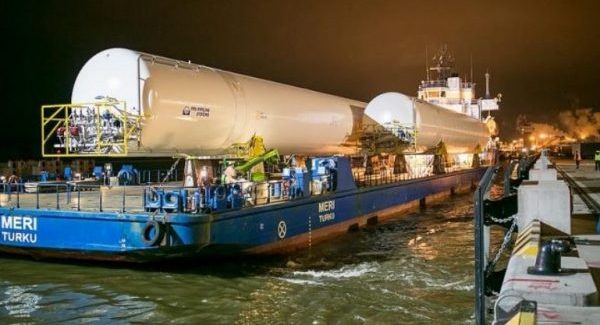Klaipedos Nafta announced that, on 13 March, the first out of three LNG tanks, shipped from the Czech Republic, will start moving to the territory of oil terminal of Klaipėdos Nafta, AB (KN), Lithuania, where the liquefied natural gas (LNG) reloading station is being built.
The LNG tank will be transported from the port to the construction site over a night, therefore, residents of the city will most probably experience no inconveniences.
The first three LNG tanks were shipped to the Port of Klaipėda in the night between 11-12 March. The tanks were brought from the factory of Chart Ferox, a.s., from which they were transported along the river Elbe to the port of Hamburg (Germany) on a special transportation barge. They were later re-loaded onto a cargo ship, and reached the port of Klaipėda, in approximately two days.
An LNG tank is an elongated steel hollow object which weighs 223 t, it is 50.3 m long, 5.8 m high and 6.03 m wide. When the LNG reloading station is launched, it will be used for keeping liquefied natural gas of -161° Celsius. Special trucks will be filled with LNG and small-scale LNG vessels. Meanwhile, Klaipėda will become an LNG hub in the Baltic Sea.
The provision of tank transportation services was entrusted to a contractor that has about 20 years of experience in transporting bulky goods and that has transported parts of a wind power plant and other type of large equipment.
During the transportation, the tanks will be accompanied by two police escorts and two communication and power supply service escorts, since road signs will have to be dismantled and re-installed at some points and power cables, as well as lighting columns, will have to be protected.
“Those LNG tanks are impressively large; there has never been a cargo of such type in the Port of Klaipėda, whereas, transportation of such tanks in the Czech Republic is usual and all services work smoothly there. During this operation, residents of the port city will suffer no significant inconveniences or limitations, though traffic might be limited in certain passages of the itinerary and there might be some power supply disruption. Nevertheless, as the tank will be transported during a night-time, we are confident that these short-term problems will not affect the normal rhythm of citizens’ life,” Marius Pulkauninkas, acting general manager of Klaipėdos Nafta, AB, commented.
When planning the itinerary, the purpose was to avoid city streets and roads as much as possible so the tanks will be transported along Palanga road. The other two tanks are planned to be transported before 20 March.
In total, five 1,000 m3 tanks will be installed in the LNG reloading station, thus two more tanks will be brought later. After the installation of all tanks, necessary equipment connection, testing and other activities will be carried out. According to estimations, the LNG reloading station will be launched late summer this year.
Source & Image credit: Klaipedos Nafta































































